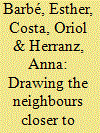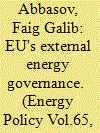|
|
|
Sort Order |
|
|
|
Items / Page
|
|
|
|
|
|
|
| Srl | Item |
| 1 |
ID:
090086


|
|
|
|
|
| Publication |
2009.
|
| Summary/Abstract |
Since the end of the Cold War, European Union (EU) efforts in transforming Central and Eastern Europe (CEE) have been enormously successful. The 2004 enlargement is widely regarded as the single most effective foreign policy strategy in the Union's history, and the recent European Neighbourhood Policy (ENP) was designed to repeat that success in countries located on the EU's new Eastern borders. Although the ENP has been the subject of substantive discussion in European academia, Belarus is the one country in Eastern Europe that has largely escaped scholarly attention. This article takes stock of recent developments in EU-Belarus relations and seeks to explain the very limited leverage of the EU over the country. We first examine the EU's relations with Belarus through the theoretical lens of external governance. By taking for granted the EU's ability to transfer its norms and values, however, the governance perspective does not account for the EU's very limited success in changing Belarus. We therefore revisit Michael Smith's notion of `boundaries of order' to highlight the impact of legal/institutional, transactional, cultural and geopolitical factors on EU-Belarus relations. We argue, in particular, that the existence and the construction of boundaries between the Union and its neighbouring states are essentially mutually constitutive processes. Besides shifting its own boundaries (and thereby extending its rules to outsiders), the EU is itself subject to the boundaries enacted by neighbouring states. In our conclusion, we juxtapose the notion of external governance as `rule transfer' with `partnership' as a more suitable mode of interaction between the EU and Belarus.
|
|
|
|
|
|
|
|
|
|
|
|
|
|
|
|
| 2 |
ID:
092877


|
|
|
|
|
| Publication |
2009.
|
| Summary/Abstract |
The European Neighbourhood Policy (ENP) launched in 2004 was purposefully conceived as a strategy to encourage neighbours' approximation with the European Union (EU). This aim by the EU to extend its own system of rules beyond member states has become the focal point of the literature on the EU's relations with neighbours. In this article, however, we aim to broaden the scope of the analysis of the EU's role as it pursues policy convergence in the ENP area. More specifically, we argue that the convergence processes can be established on a basis other than EU's norms, namely, international and bilaterally developed norms. Building on this three-fold distinction, we propose a model explaining how and when policy convergence is more likely to happen on the basis of every one of these norms. The model takes into account three variables: the structure of incentives between the EU and its neighbours, mutual perceptions of legitimacy and intra-EU coherence. Based on a number of empirical examples, we illustrate that EU-based convergence is less predominant in EU's relations with its neighbours than it is usually portrayed in the literature.
|
|
|
|
|
|
|
|
|
|
|
|
|
|
|
|
| 3 |
ID:
127163


|
|
|
|
|
| Publication |
2014.
|
| Summary/Abstract |
The major objective of this paper is to apply a multidimensional lens to the European Union's (EU's) vision to the yet to be establish Southern Gas Corridor. I will argue that, the EU's natural gas vision towards the Caspian basin is based not only on bringing additional gas volumes to the EU markets in order to ensure physical security of supply. It is rather multidimensional external governance geared, firstly, towards absorbing all the actors along the whole value chain in to the EU's common energy regulatory framework and shifting energy provision from a bilateral political domain onto a multilateral market domain. Secondly, it is a process of diffusion of norms and values into the governance system of the energy partners
|
|
|
|
|
|
|
|
|
|
|
|
|
|
|
|
| 4 |
ID:
121749


|
|
|
|
|
| Publication |
2013.
|
| Summary/Abstract |
The European Union has become an important leader in international environmental affairs - particularly through the negotiation of multilateral environmental agreements (MEAs) with favourable terms. In this article, EU environmental leadership is studied from a new perspective, focusing on the ratification stage of environmental regime formation. Specifically, it investigates whether the EU is also capable of motivating third states to join its preferred MEAs. It is argued that third states join the EU's preferred MEAs to signal their compliance with EU environmental standards in an effort to become eligible for various rewards that the EU could potentially offer, including a credible membership perspective, access to its lucrative markets, and aid and assistance. The argument is tested by examining the ratification behaviour of 25 non-EU Member States with regard to all 21 MEAs negotiated under the auspices of the United Nations Economic Commission for Europe (UNECE). The results provide robust support for the theory that EU rewards motivate third states to ratify these treaties. The results withstand a number of statistical tests, even when alternative explanatory factors such as trade intensities, transnational communication and geographic proximity are controlled for. The study is the first large-scale demonstration of the EU's external influence at the ratification stage of environmental regime formation. By identifying three different channels of EU influence, the research permits a more refined understanding of the EU's role as a promoter of environmental protection standards.
|
|
|
|
|
|
|
|
|
|
|
|
|
|
|
|
|
|
|
|
|